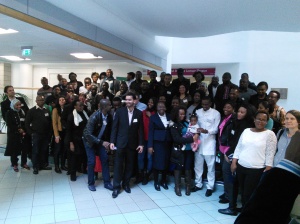 #research4Africa was the #tag name chosen for the conference arganised by commonwealth scholars for all ‘emergent’ African scholars. It was sponsored and hosted by Sheffield Hallam University. Just like Muna (click here) who has written a piece about it, I would say the ideas that floated about were so interesting that such conversations should be taking place more often.
#research4Africa was the #tag name chosen for the conference arganised by commonwealth scholars for all ‘emergent’ African scholars. It was sponsored and hosted by Sheffield Hallam University. Just like Muna (click here) who has written a piece about it, I would say the ideas that floated about were so interesting that such conversations should be taking place more often.
Three presentations by doctoral students (from Egypt, Nigeria and Kenya) kicked off the day with different assessments of research trends in Africa in their respective fields. The three key note speakers, who for organisational reasons intervened much later, provoked our thinking in more ways than one. For example Dr Brilliant of the University of Hertfordshire, summed up the status of the African diasporan scholar as frustrated, resigned to his/her liminal space attempting to overcome oppressive ideologies where he/she lives (West) and wishes to live (Africa). He recommended a radicalised ethos that would seek ways of working (may be freely) with some willing universities in Africa in order to usher in a new way of thinking.
Dr Alison of UCL and Dr Janet of Oxford touched on ways of collaboration (formal, informal…) which saw participants suggest practical ideas for future collaborative work despite the anticipated challenges that the doctoral students had explored. Some of those challenges were 1) technical (lack of resources…), 2) cultural/quality (lack of motivation to do research, the problems of identity that my friend Muna discusses in her article –Is a diasporan academic a ‘pure’ African? What is the fate of an African scholar whose work would struggle to make it to the prestigious international journal?)
To respond to some of these issues in block, I see these issues striking at the heart of the concept of ‘excellence’ not only for potential publishable work by African scholars but also that of the universities in Africa in general. How do African educational institutions define excellence? is a crucial question to be grappling with. In the book entitled ‘Africa through Structuration Theory-ntu’, I offer in chapter 5 a framework for excellence of universities in the DRC and Sub-Saharan Africa. That framework consists of local interactions, professionalism, lifelong learning and quality assurance.
Another thorny issue is the clash of identities. My response is to say that 1) this is not unique to Africans and African diaspora and 2) this can be seen both as a weakness and strength to be exploited in order to advance an agenda. Advancing an agenda is quite crucial and this is where I think the conference needs to look into in order to identify certain inroads. When I say ‘agenda’ I mean defining a mindset, an ontology that will underpin all our activities, enable us to challenge thinking and practices that do not fit into that mindset so that the African scholar does not connive with oppressors (whether in state, family, cultural institutions) but outline a code of African citizenship and leadership that is sound and based on African philosophy. In the second edition of Africa through Structuration Theory-ntu’ to appear in June this year, I outline what I call the methodology of Ubuntu (or methodology of structuration) which can serve as the basis for African identity. Here, a African will be challenged to reconsider whether he/she is at all different from a westerner! Don’t get me wrong, accents, race, food etc. distinctions are there but in terms of identity we need to look further into the sociological foundations of a society.